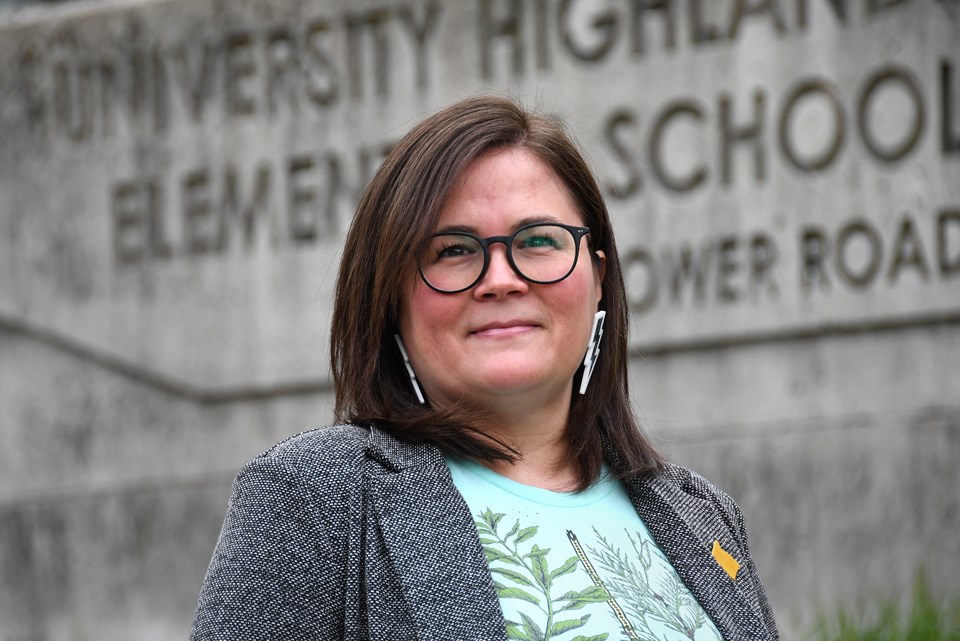Mikelle Sasakamoose may be the first Indigenous person to run for office in the municipality of Burnaby, but that’s a history that goes back only 130 years.
“The Tsleil-Waututh, Musqueam, Squamish and Kwikwetlem people have been responsible for the governance and stewardship of these lands since time immemorial,” she says. “It is important for me to acknowledge that.”
‘A long history’
Sasakamoose, a 10-year UniverCity resident, was one of two new candidates announced this month on the Burnaby Citizens Association’s school board slate for October’s municipal elections.
Her school experiences as an Indigenous person loom large when she talks about her reasons for running.
“As a First Nations person, my family has a long history that’s not a good history with public education,” she says.
She has close relatives on both sides of her family who went to residential schools – one side in Saskatchewan and the other at the Kamloops Indian Residential School, where in May 2021 ground-penetrating radar revealed the existence of what are believed to be approximately 200 unmarked children’s graves.
Growing up on the Tk'emlúps te Secwépemc reserve outside of Kamloops, Sasakamoose herself was bused to a public school in the city when she was younger.
“Kamloops wasn’t a very diverse community, and there was a lot of racism,” she says. “All the First Nations kids from the reserve would come and just be spilled into one or two schools every day. It was a very challenging time, I’ll say, for us. We experienced a lot of racism and discrimination, not just from our peers but from teachers and administrators in the school.”
And when her oldest daughter started school in the Canyon Heights neighbourhood in North Vancouver, she felt isolated as the only First Nations student there.
The family’s experience with public schools improved dramatically when Sasakamoose and her husband moved to Burnaby and their daughters started at University Highlands Elementary School.
“It was just so welcoming, and the teachers were just so wonderful and understanding and inclusive. It’s really the first time in my experience with public education that I’ve felt like that. It’s a school environment that I personally could have never imagined as a First Nations person going to school in Canada.”
But Sasakamoose is concerned not all students and families find that same kind of welcome at their local school.
“It just makes me feel really happy, but, at the same time, I know that’s not the situation at all schools in Burnaby or anywhere for that matter,” she says.
Engagement
Politics and activism run in Sasakamoose’s family, according to the school board hopeful.
Growing up just a few steps away from her great-grandfather’s house on a ranch outside of Kamloops, she remembers many of her family members engaging with politicians, building relationships and lobbying government.
Her cousin, the late senator Len Marchand, was the first Status Indian to be elected to Parliament.
“I observed this when I was growing up, how they engaged with government to make things better in our community,” she says. “I really learned that from them.”
It was her own involvement in child-care issues on Burnaby Mountain that brought her to the notice of the BCA.
She had joined the SFU Child Care Society board after years of trying and failing to get her daughters into child care on the mountain because her family isn’t affiliated with the university.
Then, a couple of years ago, B.C. Minister of State for Child Care Katrina Chen – a former BCA school trustee herself – happened to be door-knocking in the neighbourhood one day.
Sasakamoose was introduced to her as someone who was very involved at University Highlands and knew a lot about child care on the mountain.
They hit it off, and Chen eventually introduced Sasakamoose to BCA president Leila Lolua and the party’s new push toward greater equity and diversity.
“As a First Nations person, as a woman, as someone who’s experienced poverty, I think I just related more to their values,” Sasakamoose says of the NDP-aligned municipal party.
‘Passion’
Sasakamoose has been a federal public servant since she quit a journalism job at Kamloops This Week in 2009 to take a job in Indigenous relations with Statistics Canada.
She moved over to Transport Canada in 2017 and recently took on a newly created position there: senior policy advisor to the director of Indigenous relations on reconciliation.
Sasakamoose says her new job is a culmination of years of work she’s been doing off the side of her desk, promoting Indigenous awareness and reconciliation in the federal public service.
“That’s really where my passion is,” she says.
She plans to bring that same passion to her work as a trustee if she’s elected.
“I’m really hoping not only to bring a voice on behalf of my community to the school board but to be able to create opportunities for other communities to have voices at school board,” she says.
Follow Cornelia Naylor on Twitter @CorNaylor
Email [email protected]



